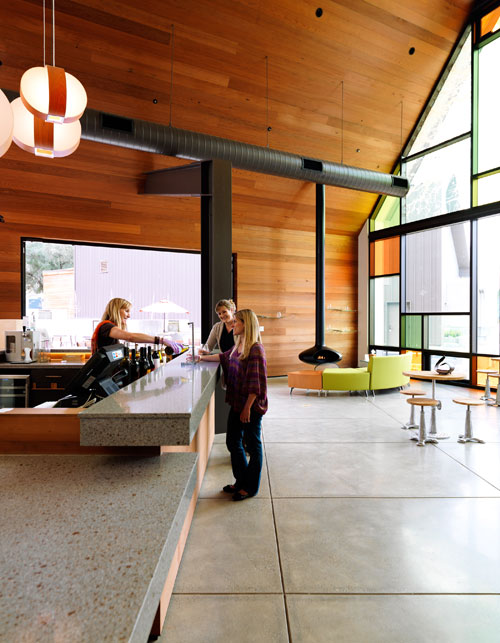
Shale Oak Winery achieved Gold LEED Certification for its eco-friendly design.
Sustainability in practice at award-winning winery
Entrepreneur/farmer Al Good had a holistic vision in mind when he decided to establish Shale Oak Winery on Paso Robles’ Westside. The goal was to have next to zero impact on the surrounding environment. Keeping that vision, Good tapped the San Luis Obispo-based firm of Studio G2 Architects to create the avant-garde architectural style.
In collaboration with Balance Green Consulting, the Studio G2 team set out to design the tasting room with sensitivity to the existing environment with a goal to achieve Silver LEED (Leadership in Energy & Environment Design) Certification. The team’s keen eye and eco-friendly design resulted in a Gold LEED Certification for Shale Oak.
Sustainability practiced throughout
Sustainability is practiced in every aspect at Shale Oak, from the vineyards to the eco-conscious design of the winery and tasting room; safe pest management is practiced in the vineyards with respect to wild habitat preservation and special attention is paid to water conservation in a drought-ridden region like Paso Robles. A bioswale makes use of rainwater that allows vegetation to use the water, encouraging it to percolate back into the ground instead of running off site and affecting streams and creeks. Any runoff is used for landscape and vineyard irrigation.
Concrete and decomposed granite are used in parking and driving areas; such materials are lighter than black pavement and reflect light rather than create hot spots. Decomposed granite also allows water back into the ground instead of running off. Energy efficient devices such as solar photovoltaic panels generate about one third of Shale Oak’s energy needs. Windows and sun tubes almost completely eliminate the need for electric lights during the day.
The eco-conscious theme follows through in the gift boutique stocked with bags and jewelry designed from recycled cork. Even the tasting menu sheet is made of recycled paper embedded with wild flower seeds that visitors can take home and plant in their own gardens. The tasting room reflects a keen sense of balance between design and natural environment – the high ceiling room opens out to an inviting terrace, a spot to enjoy a glass of wine and take in the serenity of this intimate space.
Vineyards produce award-winning wines
Shale Oak farms 70 acres of vineyards on two properties: Grenache, Syrah and Zinfandel varietals are planted on the Westside and the Pleasant Valley vineyard is planted to Cabernet Sauvignon, Petite Sirah, Petit Verdot and Albariño. The first 2008 vintage of a mere 100 cases has now grown to an annual production of 3,000 cases.
For a relatively new winery, Shale Oak has picked up several accolades: a silver medal from San Francisco Chronicle Wine Competition for its premier 2008 vintage of Syrah, gold medals for the 2009 Petite Sirah from Sunset Magazine Wine Competition and the 2010 Albariño from San Francisco International Wine Competition and three silver medals for the 2009 Petit Verdot — one each from San Francisco, Sunset Magazine and Central Coast Wine Competitions.
Winemaker Curtis Hascall’s hands-on style of winemaking begins in the vineyards. The grapes are twice hand-sorted on the sorting table, he explained.
“It helps making sure our wine tastes clean,” he said. Attention is paid to toss out under-or-over-ripe fruit. “We pull out lots of raisins especially in Zinfandel, which is a hard to control.”
Tasting line up
The tasting lineup begins with Albariño, the Spanish white varietal. It’s refreshing to taste the Albariño blended with 5 percent Viognier; the 2011 vintage is bright and citrusy with hints of vanilla and kumquat. The 2011 Rosé, a blend of Grenache and Syrah, is fragrant with rose petals and strawberry aromas.
Shale Oak’s Zinfandel is far from being jammy – the 2010 vintage has bright fruit laced with spiciness; it’s blended with 17 percent Petite Sirah, which adds structure and backbone to the wine. The deep ruby-hued 2009 Cabernet Sauvignon is a burst of dark berries with soft tannins. A mouthful of creamy caramel and hints of violets come through in the 2010 Petite Sirah while the 2011 Petit Verdot is a riot of black cherry, spice and vanilla.
Keeping in step with nature and its eco-theme, Shale Oak is planning a program of Zinfandel-based wines with a Japanese theme of five elements: KÜ (sky), SUI (water), KA (fire), FU (wind) and DU (earth). Kicking off with the 2010 vintage, KÜ is a deep dark wine with luscious raspberry notes. Blended with Petite Sirah, Cabernet Sauvignon and Grenache, the Zinfandel-based wine has a lingering cedar finish, reminiscent of a walk through a forest after a rainfall when cedar smells fill the air.
The Shale Oak Winery tasting room, located at 3235 Oakdale Road in Paso Robles, is open Thursday through Monday, 11 a.m. to 5 p.m. For more information, visit shaleoakwinery.com or call (805) 239-4800.
— Mira Advani Honeycutt











